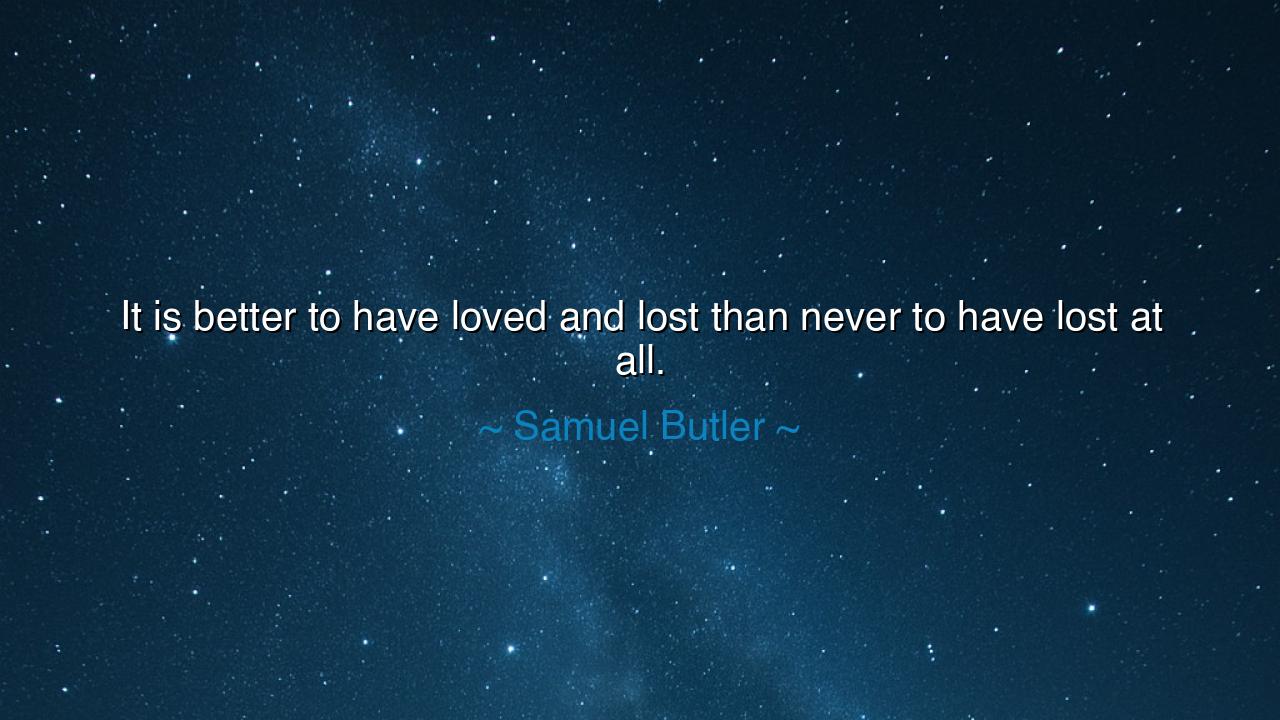
It is better to have loved and lost than never to have lost at






The English satirist Samuel Butler once uttered the paradoxical line: “It is better to have loved and lost than never to have lost at all.” In its irony, the saying mirrors and subverts the more famous words of Alfred Lord Tennyson, who had written: “’Tis better to have loved and lost than never to have loved at all.” Butler twists the sentiment, not to deny love’s worth, but to expose with sharp wit the pain that accompanies it. For he reminds us that love does not only lift—it wounds. To love is to step willingly into the possibility of loss, and to experience loss is to carry the mark of love.
This phrase invites us to ponder the dual nature of love: it is joy and sorrow, union and separation, birth and burial. Butler, being a satirist, sought to strip away illusions. In his telling, the greatness of love cannot be divorced from its inevitable grief, for all who taste love must also taste loss. In this sense, his words are not cynicism but wisdom: he declares that loss is not merely possible, it is part of love’s very design. To love and lose is to live fully, to know both sides of the eternal coin.
History gives us shining examples. Consider the story of Abelard and Héloïse, two lovers in medieval France. Their passion burned brightly, yet it brought them to ruin—Abelard mutilated, Héloïse cloistered in a convent. To them, love was both exaltation and destruction. Yet centuries later, their letters remain among the most powerful ever written, proof that even in tragedy, love’s flame endures. They had loved, and they had lost—yet their loss preserved their voices for eternity.
Butler’s irony also warns us against the childish notion of love as an endless fairytale. He teaches that loss is not an accident of love, but its inevitable companion. Death, distance, betrayal, or even time itself—all conspire to make love a fragile, passing gift. Yet within this fragility lies its beauty. For what value has a diamond if it could never be shattered? What glory is there in a flame that never risks being extinguished? The greatness of love is measured precisely in its capacity to wound us deeply.
And yet, there is hope here too. For even in loss, love leaves its imprint. The one who has suffered the breaking of love carries scars, but also carries a greater depth of soul. Think of Queen Victoria, who mourned Prince Albert for forty years. Her grief was vast, yet in that grief she became a figure of resilience, embodying love that endured beyond death. She had loved, she had lost, and in the loss she became something more than she had been before.
Thus, the lesson is this: do not flee from love out of fear of loss, nor curse loss as though it were love’s betrayal. To lose is to prove that you have lived, that you have dared, that you have given your heart in trust. Butler’s irony reminds us that to love without risk is to have never truly loved at all. Embrace both the rising sun and the setting dusk, for both belong to the day.
Practically, let us live with courage: love freely, knowing loss will one day come; grieve honestly, knowing grief itself is the echo of love; and cherish the memory of what was, rather than despair that it is no more. In this way, we turn Butler’s irony into truth: it is better to have loved and lost, yes—but even more, it is better to accept that loss itself is part of the gift of love.
So, children of the future, let Butler’s words sharpen your wisdom. Do not be afraid to suffer for love, for that suffering is proof of life. Do not be afraid to lose, for in losing, you show you once held something worth everything.






AAdministratorAdministrator
Welcome, honored guests. Please leave a comment, we will respond soon